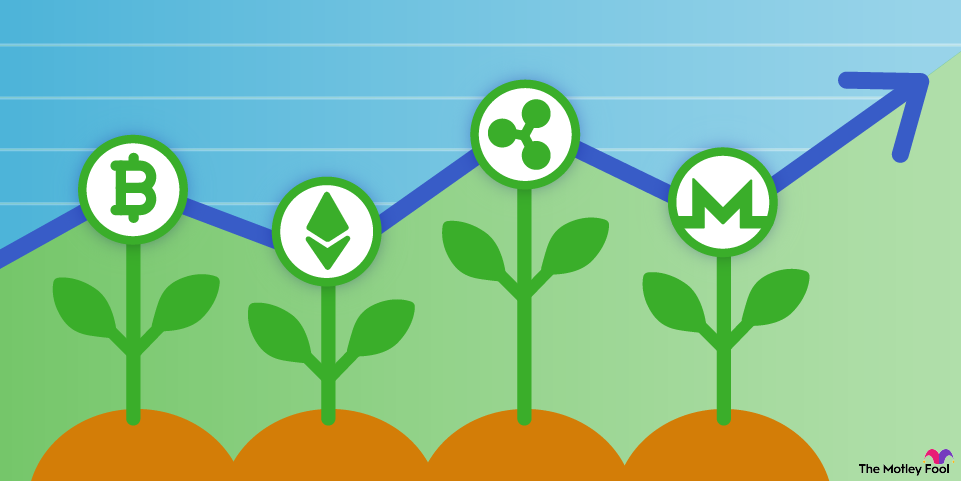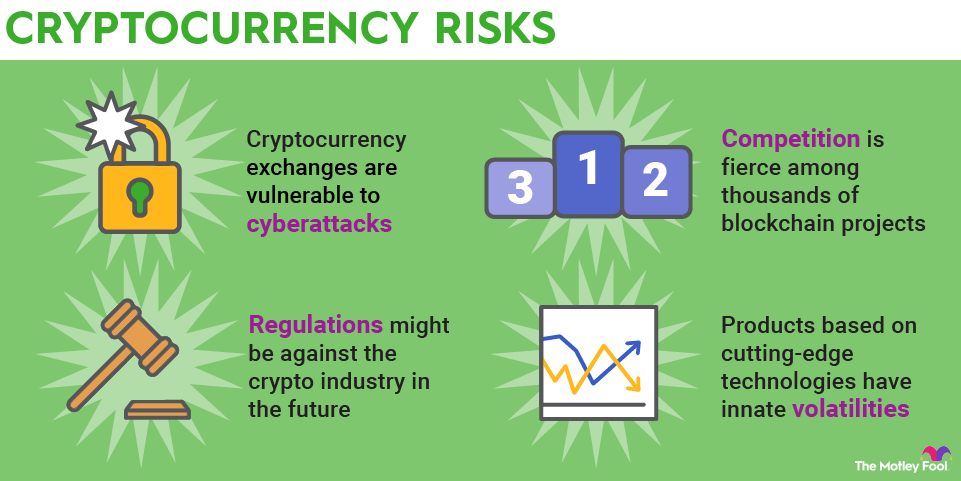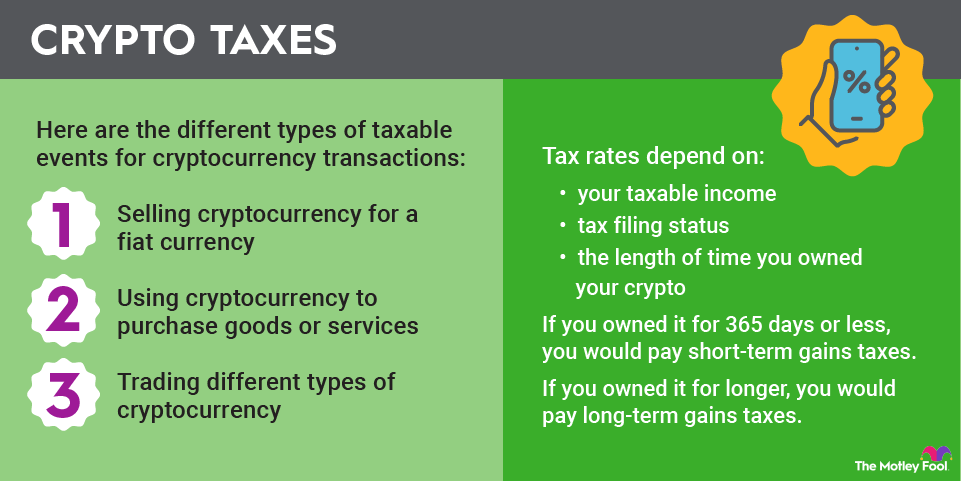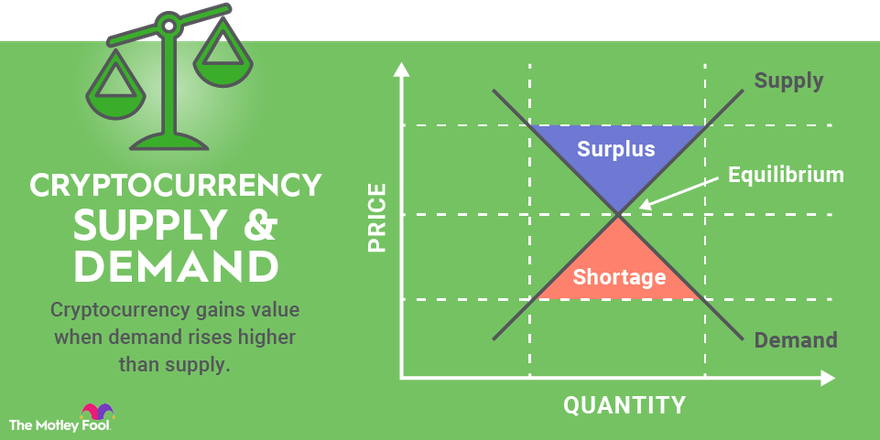Cryptocurrencies have become a hot investment that is gaining mainstream adoption. Markets for digital currencies such as Bitcoin (BTC +1.18%) were virtually unheard of in 2012, but they have since grown into a massive industry.

The cryptocurrency sector reached a market value of $3 trillion in the fall of 2021 and has continued to rise to a total market cap of roughly $3.9 trillion. The sudden surge in value and rapid evolution created immense wealth for early crypto investors.
Everyone wants to know which token will become the next Bitcoin or Ethereum (ETH +0.63%). With thousands of active cryptocurrencies on the market, investing in technologies linking the digital blockchain space with society could be even more lucrative. And there is no shortage of innovative companies and investment vehicles trying to bridge the gap between the two.
Digital currency companies hold major potential
The original idea behind blockchain technology -- a digital ledger that automatically tracks transactions between parties and confirms ownership of a crypto asset -- was to create a borderless, peer-to-peer electronic cash payment system that's efficient and secure.
Investors can certainly purchase cryptos themselves, perhaps by buying small amounts of several different cryptocurrencies. Another way to gain exposure to the sector is to invest in bigger and more established companies that benefit from the increased popularity of blockchain and crypto assets. The revenue that crypto service providers are deriving from blockchain tech has grown explosively over time.
Companies that adopt blockchain technology, especially in finance, may gain a considerable edge over traditional competitors in processing payments. Brokers offering digital assets may attract more customers than exchanges offering traditional assets such as stocks and bonds.
You can even buy exchange-traded funds tracking the spot price of Bitcoin nowadays. Eleven such funds were approved in January 2024, with the most popular names including the iShares Bitcoin Trust (IBIT -0.38%) and the Fidelity Wise Origin Bitcoin Trust (FBTC -0.42%). The ETFs make Bitcoin easily available to several new investor types.
However, the sector is subject to sharp market swings. Its peak value of $3 trillion slipped to less than $1 trillion in June 2022 as rising inflation drove many investors away from high-risk investments. The economic downturn also coincided with a downtrend in the cyclical crypto market, also known as a crypto winter.
This was not the crypto market's first gigantic plunge, and it probably won't be the last. Every investment is subject to risks, and you should only invest money you don't need in the short term. That guidance is even more important in the highly volatile crypto sector.
In keeping with that guidance, here are some of the best crypto and crypto-related stocks to consider.
Cardano (ADA)
1. Coinbase Global
Coinbase Global (COIN -1.06%), a top cryptocurrency trading exchange, made its initial public offering (IPO) in April 2021. The company is a popular platform for purchasing major cryptocurrencies such as Bitcoin, Ethereum, and Cardano (ADA -1.92%), allowing users to trade about 250 cryptocurrencies, including many altcoins.
The Coinbase platform's success has been contingent on the increase in crypto prices, which in turn has led to millions of new users creating accounts. Coinbase earns a small transaction fee whenever someone buys or sells a cryptocurrency.
But the company aspires to be more than just a place to trade. It also sponsors a debit card that allows consumers to spend from the balance in their digital wallet, and it's launched a cloud platform for companies using and storing digital currencies.
Coinbase offers two game-changing innovations. The first is bringing the practice of asset loans -- which were previously only available to affluent investors -- to the masses. Users can pledge their Bitcoin or other cryptocurrencies as collateral and receive a low-interest loan to cover expenses. Using crypto as collateral means investors don't have to sell their assets when emergencies arise, allowing their principal to continue compounding.
The second innovation is the rising adoption of Coinbase's blockchain analytics by governments and financial institutions. Because most blockchains operate on a public ledger, the company can harness and monitor the data for illicit transactions and wallet addresses.
Suppose hackers managed to break through an individual's computer and demand a ransom in the form of Bitcoin to unlock the machine. In that case, Coinbase could then match the hacker's wallet address with millions of know-your-customer (KYC) data points stored on its platform. This could help law enforcement track down the flow of funds and apprehend the cybercriminals -- building greater trust in the crypto space.
All in all, investing in Coinbase is a broad bet on the crypto market. If crypto trading and ownership gain traction in the long run, Coinbase and its shareholders will benefit from the digital currency trend.
[Cryptocurrency] is a new asset class, but like real estate, there's only so much Earth. So it's defined, and therefore this moving price of the commodity is just how much, within this finite class of a commodity, this new asset class, how much people value it or want it.
2. Block and PayPal Holdings
At the heart of every digital payment protocol is the absence of central intermediaries (which means lower costs for businesses and consumers). So, Block (XYZ +1.71%) (formerly Square) and PayPal (PYPL +1.05%) saw a meaningful business opportunity in enabling users to purchase and hold cryptocurrencies within a digital wallet.
In late 2017, Block's Cash App consumer-facing application began allowing Bitcoin trading. Bitcoin is often a huge revenue generator for Block when cryptocurrencies are on an upswing, although the trading feature is not helping the company's bottom line very much. In 2025, Block managed over $3 billion of quarterly Bitcoin revenue.
However, the company is helping to foster the use of Bitcoin among its business users (through the Block ecosystem), and it could become a top platform for crypto transactions between companies and their customers. This is especially promising for disrupting traditional international transactions in which banks often charge hefty foreign exchange fees. Cash App added support for the Bitcoin Lightning Network in April 2022, allowing customers to transfer Bitcoin much faster and without transaction fees. CEO Jack Dorsey said the feature will "increase the usability of Bitcoin, all toward an open global monetary transmission network the world can trust."
PayPal's Venmo digital wallet and peer-to-peer payments app, which unlocked crypto trading in early 2021, offer a similar mix of simple banking features and mass-market crypto-trading tools. At the launch, Venmo supported the trading of Bitcoin, Bitcoin Cash (BCH +6.67%), Ethereum, and Litecoin (LTC +1.36%). Other cryptos may appear over time, like the PayPal USD (PYUSD -0.02%) stablecoin that became available in 2023.
With the most users of any peer-to-peer money movement app, Venmo could become a leading cryptocurrency platform with its new feature. It serves as a solid access point for investors who wish to buy major cryptocurrencies and then use them to purchase altcoins or access decentralized finance (DeFi) applications.
3. Canaan and Hut 8 Mining
Bitcoin mining has changed dramatically over the past few years. These days, companies such as Canaan (CAN -0.91%) design high-powered, application-specific integrated circuit (ASIC) machines specifically for the purpose of brute-force guessing correct hashes for proof-of-work cryptocurrencies. Canaan's next-generation Avalon ASICs can make tens of trillions of guesses every second for the right hash to validate blocks on the Bitcoin network, which is millions of times more powerful than AMD (AMD +0.07%) and Nvidia's (NVDA -0.32%) latest graphics processing units (GPUs). Sales have been skyrocketing due to the device's affordability and relatively low energy consumption, meaning greater profits for miners.
One of the most popular Bitcoin mining stocks is MARA Holdings (MARA +0.66%). The Florida-based company commands a sizable minority stake in the overall Bitcoin network, and it generates very strong cash flows compared to revenue. Instead of selling the Bitcoin it mines on the market, the company formerly known as Marathon Digital Holdings records its mining rewards in the form of digital assets rather than selling the coins to generate dollar-based results.
Investors can be assured that environmental concerns regarding the practice won't hold the company back since it relies on renewable energy sources and can lease its electricity back to local utilities as needed.
4. Strategy
The company formerly known as Microstrategy has rebranded itself as Strategy (MSTR +0.53%), and its wholehearted focus on cryptocurrency operations is Wall Street's worst-kept secret.
The company started converting its cash reserves into Bitcoin in the summer of 2020, and its enterprise software operations soon started to look irrelevant.
In February 2025, the company held 478,740 Bitcoins on its balance sheet at a spot-price value of $46.6 billion. Strategy also continues to buy more Bitcoin, with an official plan to raise $21 billion in loans and another $21 billion in stock sales to support more crypto acquisitions from 2024 to 2027.
It's a bold strategy with massive potential upside if Bitcoin's value keeps rising in the long run. It's also a risky one, as it will expose you to huge risks if the Bitcoin story goes off the rails for some reason.
Strategy is best managed as a small and speculative investment, large enough to make a potential difference but small enough that you won't lose much sleep if it goes to zero. It's an all-or-nothing approach to Bitcoin's fundamental value, amplified with traditional business tools such as loans and opportunistic stock sales.
5. Robinhood Markets
Robinhood Markets (HOOD +0.17%) is a popular discount brokerage app that allows users to buy stocks, options, rare metals, and now, cryptocurrencies. Investors can buy and sell more than a dozen cryptocurrencies, including Bitcoin, Ethereum, and Dogecoin (DOGE -2.12%), commission-free on the platform, 24/7. The company already holds billions of dollars in crypto assets under custody, with crypto trading revenue now comprising a significant portion of overall sales.
Robinhood can combine its commission-free trading model with scaling the number of cryptocurrencies on the platform, gaining a massive competitive advantage over both traditional and decentralized exchanges. The company also could offer the same crypto analytics services as Coinbase to further promote trust in the sector and boost its adoption.
Bitcoin Cash (BCH)
6. CME Group
CME Group (CME +0.31%) operates the world's largest financial derivatives exchange, allowing investors to trade futures, which bet on the future price of an asset, and options, which grant investors the option to sell or buy an asset in the future at a predetermined price. CME Group's exchange trades a diverse assortment of assets, including agricultural and mining products, energy, stocks, and currencies. It's the latter that makes CME Group a crypto stock.
At the end of 2017, CME established the first market for Bitcoin futures. At the start of 2020, the company created a market for options on Bitcoin futures. By March 2022, Ether (units of the crypto platform Ethereum) also had futures available on the exchange. Both Ether and Bitcoin futures were joined by micro futures this year, based on smaller slices of the underlying cryptocurrencies.
Establishing a full-featured exchange for derivatives of the best-known cryptocurrencies has given Bitcoin and Ethereum some extra legitimacy and provided a way for digital currency owners (both individuals and a growing list of businesses that accept cryptocurrencies as payment) to mitigate risk from changes in cryptocurrency prices. Cryptocurrency derivatives are still a small market for CME Group, but adding more exchanges for crypto assets in the future is possible -- and even likely.




































